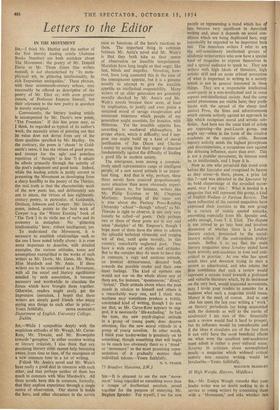Letters to the Editor
IN THE MOVEMENT SIR,—I think Mr. Hartley and the author of the first literary leading article (Autumn Books Number) are both mistaken about The Movement: the poetry of Mr. Donald Davie or Mr. Thom Gunn (the writers named), is not characterised by its meta- physical wit, its glittering intellectuality, its rich Empsonian ambiguities.' These phrases, with their seventeenth-century echoes, may reasonably be offered as descriptive of the poetry of Mr. Eliot or, with even greater reason, of Professor Empson himself, but their relevance to the new poetry in question is merely marginal.
Conveniently, the literary leading article Is accompanied by Mr. Davie's new poem, ' The Fountain.' If this fine poem may, as I think, be regarded as typical of its author's work, the necessity arises of pointing out that its value does not derive from any of the three qualities specified by Mr. Hartley. On the contrary, the poem is chaste' in Gold- smith's sense, it has the virtues of good prose, and (except for the ugly and pointless repetition of thought' in line 7) it attains its effects primarily through the activity of the poet's judgement and good taste. Indeed, while the leading article is partly correct in presenting the Movement as developing from a sharp hostility to the poetry of the Thirties, the real truth is that the characteristic work of the new poets has, and deliberately sets out to attain, the virtues of late eighteenth- century poetry, in particular, of Goldsmith, Denham, Johnson and Cowper. Mr. Davie's poem, indeed, points to the best work of Cowper (e.g. the Winter Evening' book of ' The Task ') in its virile use of verbs and its
economy in metaphor. No ' glittering intellectuality' here: robust intelligence, yes.
To understand the Movement, it is necessary to establish relationships such as the one I have noted briefly above: it is even more important to describe, with detailed examples, the various attitudes, tones and assumptions exemplified in the works of such writers as Mr. Davie, Mr. Gunn, Mr. Wain, Miss Murdoch and Mr. Amis. If these writers arc to be considered as a Movement, with all the social and literary significance entailed by such association, it becomes necessary and worthwhile to elucidate the forces which have brought them together. Otherwise, readers might easily get the impression (mistaken, I hope) that these writers arc simply good friends who enjoy saying nice things to each other in print.—
Yours faithfully, DENIS DONOGHUE Department of English, University College, Dublin


































 Previous page
Previous page